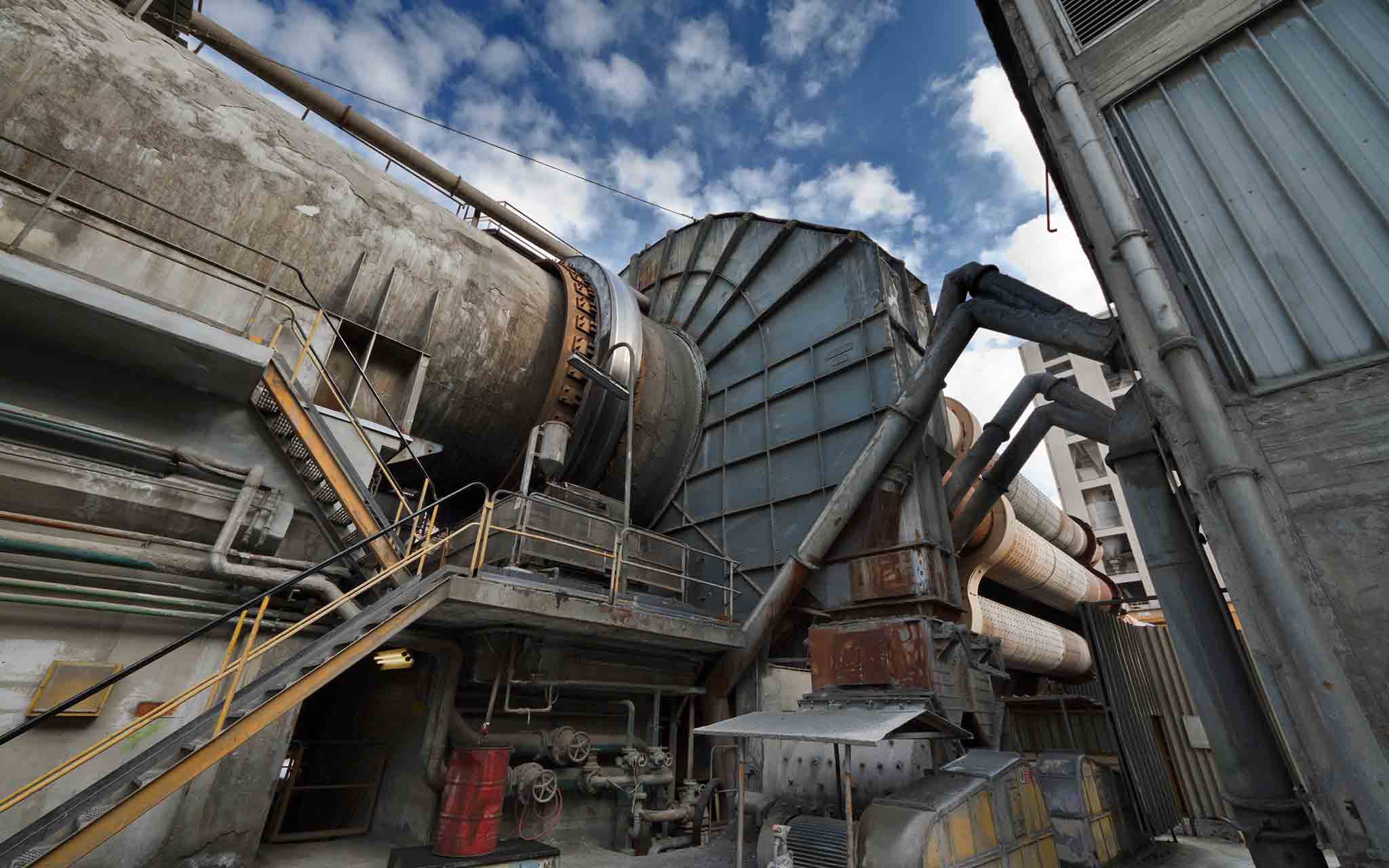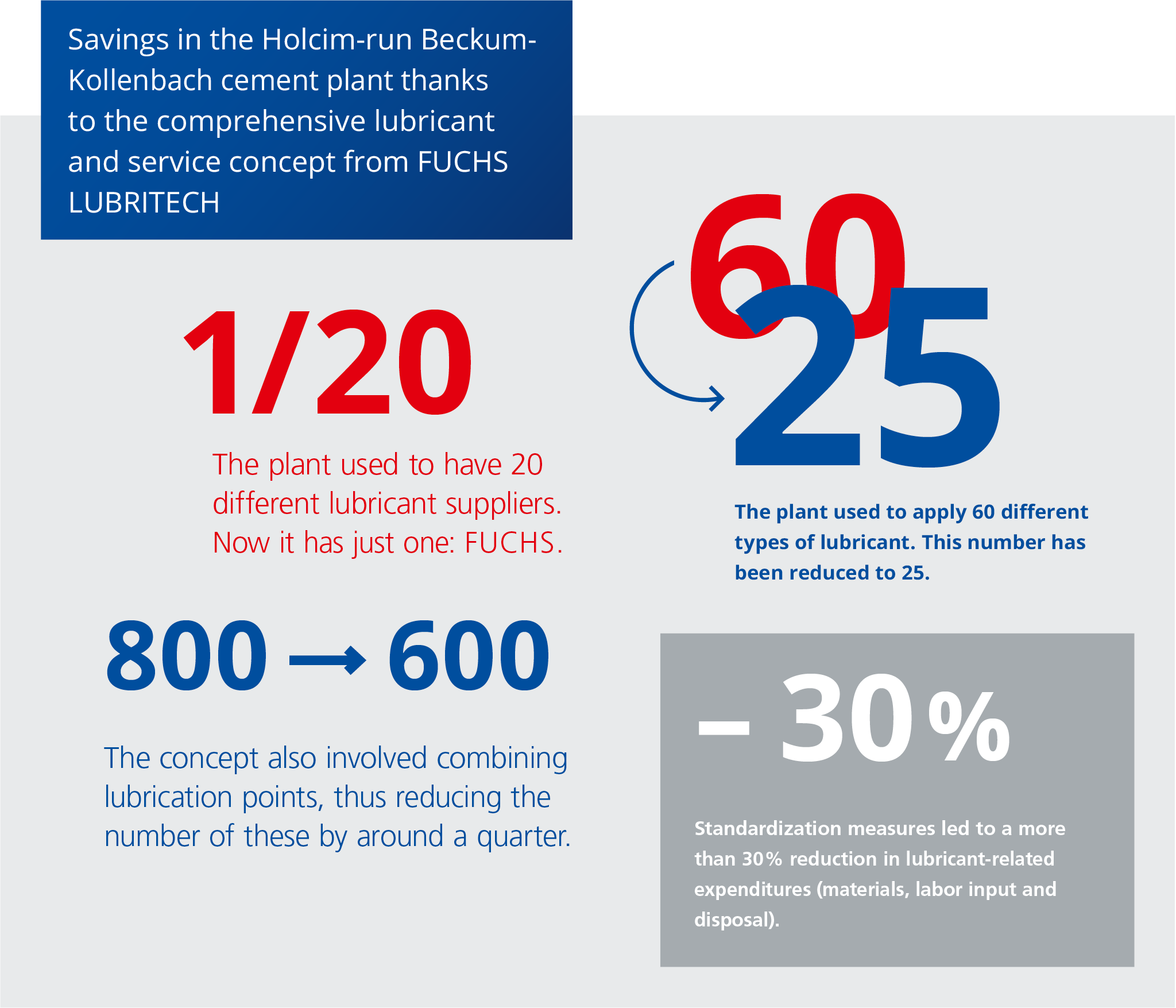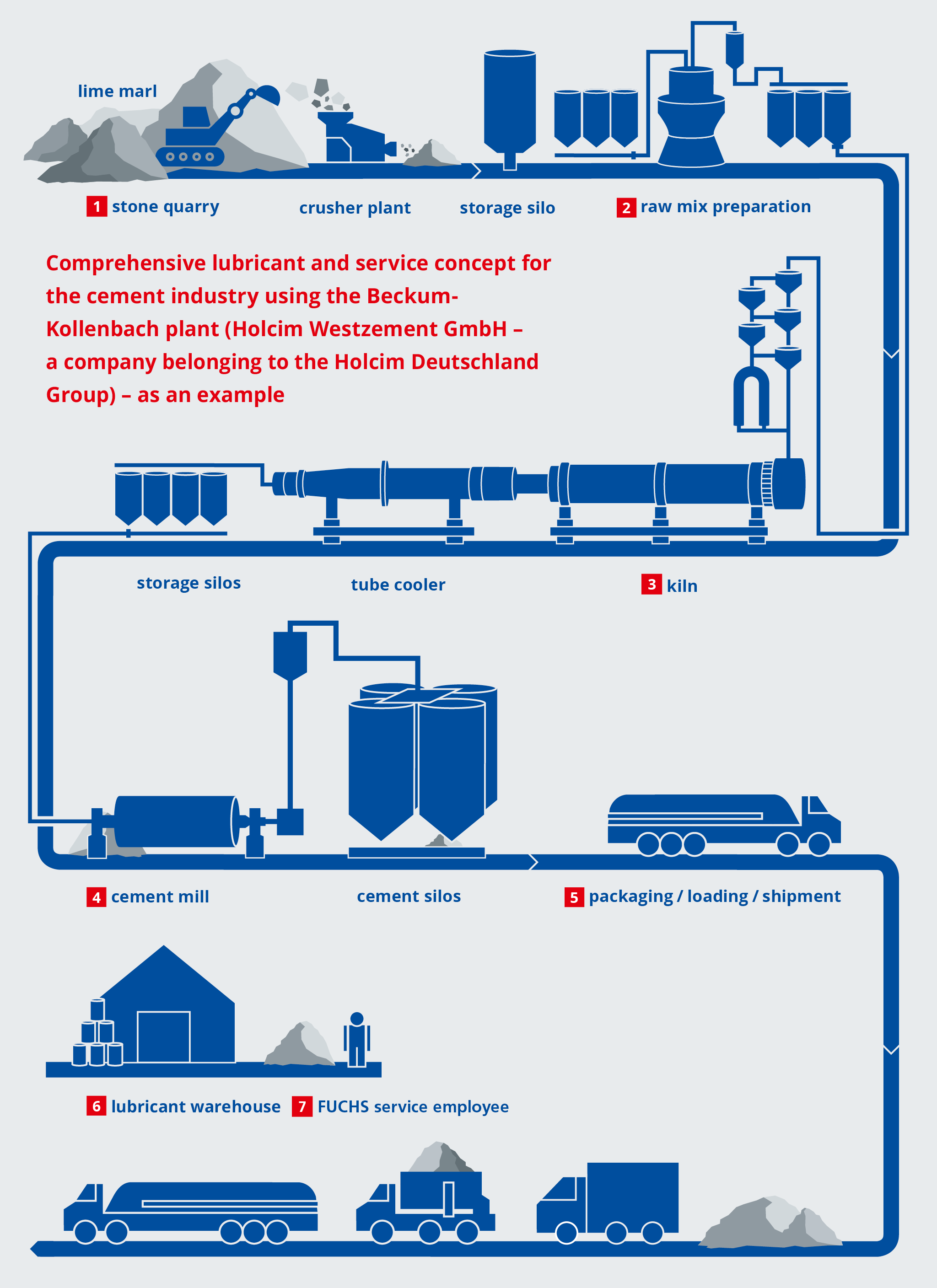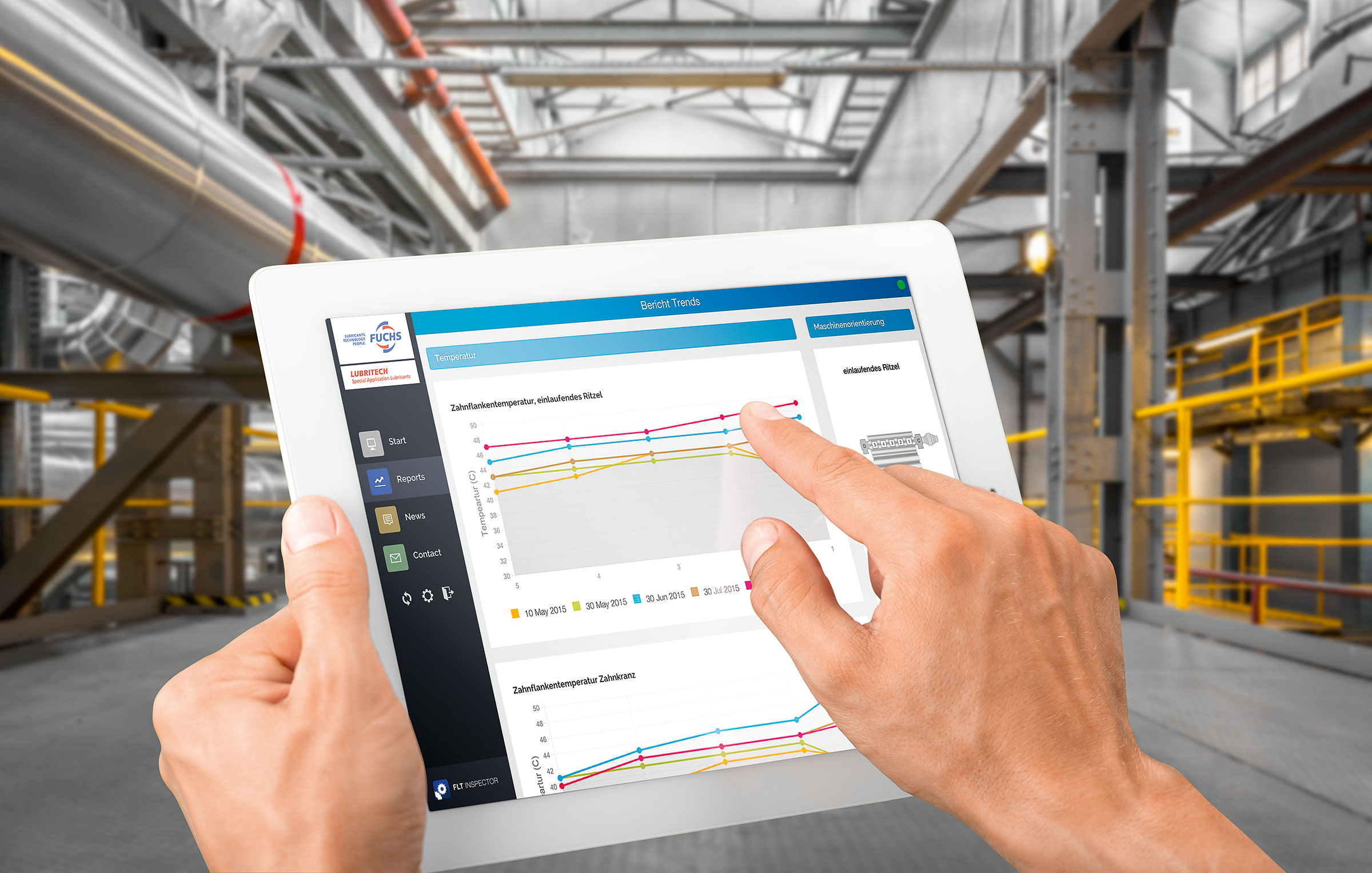Heat, vibrations, huge loads – cement plants are among the most demanding users of lubricants. FUCHS offers more than just a range of specialty products for this industry, as this story of an exemplary partnership explains.
“When people who don’t work in this industry walk in, their jaw always hits the floor.” Martin Tebeck knows that he works in a very special and unusual environment, in a plant containing mills weighing hundreds of tons, a rotary kiln almost the length of a soccer field and other gigantic installations. Even people who are used to being surrounded by technology and machinery cannot help but stand in awe at what they see. “This is not all fun and games,” says Tebeck with a smile. “We have all the fun stuff: loads and machinery of massive proportions – plus it is always hot in here.”
Tebeck heads a team focusing on preventive and condition-based maintenance at the Beckum-Kollenbach cement plant, which belongs to the Holcim Deutschland Group – one of Germany’s leading manufacturers of building materials. In other words, it is his job to ensure that the machinery and installations in the plant operate without interruption and that any downtime – except during the annual plant overhaul – is avoided. Lubrication plays a key role here. “It might make up just 5% of our maintenance work, but it is one of the most important tasks of all for ensuring the availability of our machines.”
The lubrication process is not only crucial, but also complex – and an important cost factor. Hundreds of places in a cement plant need oils, greases or specialty lubricants that, depending on where they are applied, need to withstand huge loads, vibrations, dust and heat – sometimes all at the same time. Of course, this means that many different types are required. The Beckum-Kollenbach cement plant, for example, used to apply 60 different lubricants from 20 suppliers – but then the company invited tenders for a standardized, overall lubricant concept. The final contract was awarded to FUCHS LUBRITECH.
That was in 2000. Since then, the FUCHS subsidiary has provided the cement plant with comprehensive support. All the lubricants used in the plant are FUCHS products, and FUCHS also provides a range of consulting and other services. Furthermore tribology training sessions are organized for the plant employees. “As a result, we have reduced the number of lubricants in use to just 25,” says Klaus Holz. The head of Technical Services at FUCHS LUBRITECH was in charge of formulating the original lubricant and service concept back in 2000. This reduction in the number of different lubricants meant that higher-quality lubricants were used than before, but at the same time longer change intervals and lower consumption were achieved – in short, the company benefited from major savings. “If you include labor input and disposal, this standardized concept helped the plant to cut its lubricant-related costs by more than 30%.”

To ensure that everything functions smoothly, a qualified service engineer regularly visits the cement plant. Measurements are performed on the machines, their condition is documented, and minor instances of damage are repaired. The service engineer is also available at any time as permanent contact person. And there was another situation when Martin Tebeck was especially pleased to have the service engineer’s support: when a special grease was used to run in new gears in the cement mill drives. “That’s a really nerve-racking task. You only get to do that two or three times in your career.”
FUCHS LUBRITECH, in turn, benefits in more ways than simply enjoying the sales from its long-term customer: When it developed a new adhesive lubricant for open gears, the Beckum-Kollenbach cement plant was the pilot customer. “Of course, new lubricants undergo rigorous testing in our laboratory, but things are always a bit different in practice,” says Klaus Holz. Thanks to this long-standing, trusting relationship and partnership, an initial application test was conducted in Beckum. “This played a major role in the success of CEPLATTYN GT 10,” says Holz. “With this product, we are currently an innovation leader on the global market.”
But if you ask why this partnership continues to this day, the cost factor is just one – albeit fundamental – reason. “Of course, we have to constantly keep a close eye on the market and compare prices,” says Martin Tebeck. But, as he says, the quality – in terms of both products and service – is right. “Whenever I call FUCHS LUBRITECH with whatever question or query I may have, I always receive highly professional support.” The most important aspect, however, is the service – particularly for open gears. These huge, exposed gear designs are responsible for driving the rotary furnace and cement mills. “This is one of the most complicated tasks,” explains Günter Huschitt, Team Leader Application Engineering. “If the lubricant fails to do its job here, it can result in serious damage.”

Holcim Zementwerk, Beckum-Kollenbach
Holcim Deutschland Group
The Holcim Deutschland Group is one of the leading building materials manufacturers in Germany and the Netherlands. In addition to its three core areas of aggregates, binders and concrete, it also offers complete building materials solutions, logistics services and complementary services. Around 1,800 employees work at more than 130 sites in Germany and the Netherlands – including the Beckum-Kollenbach cement plant, which joined the Group in 2015. As a wholly owned subsidiary of the Switzerland-based LafargeHolcim Ltd, Holcim Deutschland also benefits from the network and experience of this global market leader.


1. Mobile machinery such as excavators, conveyor belts and crusher plants require a wide range of different lubricants such as engine, gear and hydraulic oils. Challenges: dust, weather conditions (heat, cold, rain, snow).
2. The mills, mixers, separators, silos, conveyor belts and screens in the raw mix preparation plant require gear and hydraulic oils, roller bearing greases and adhesive lubricants. Equipment and lubricants must be able to withstand high levels of stress, dust and vibrations.
Martin Tebeck: “From the raw mix preparation stage onward, we operate around the clock – all the subsequent steps are immensely important for us. Whenever possible, we try to operate throughout the year without any inter- ruptions – except when it is time for the annual overhaul.”
3. The outside of the 80-meter-long rotary furnace, which has a diameter of 5.2 meters, can reach temperatures as high as 350°C. It is driven by an externally positioned, open gear, which is lubricated with a specialty adhesive lubricant.
Martin Tebeck: “While downtime with any other facility would be merely annoying, with the kiln it would be a disaster.”
4. The cement mills include the biggest open gears in the Beckum-Kollenbach plant: Gears with a diameter of 6.5 meters and a width of 50 centimeters turn a load weighing 600 tons 14.6 times per minute. To cope with these huge loads as well as all the associated vibrations and dust, a high-performance adhesive lubricant is necessary.
In 2012, the FUCHS LUBRITECH developed adhesive lubricant CEPLATTYN GT 10 was put to the test for the first time under real-life conditions on the open gear of one of the two cement mills. Klaus Holz: “This joint test played a crucial role in the huge success of the product. This was made possible thanks to the excellent, long-standing, trusting partnership that we enjoy with Mr. Tebeck.”
5. The packaging/ loading/ shipping stations require a whole range of lubricants such as gear oils, hydraulic oils and roller bearing greases.
6. The lubricant warehouse on the plant premises in Beckum- Kollenbach is a “consignment stock”: The lubricants there belong to FUCHS LUBRITECH. Once they are removed from stock and this process has been recorded in the inventory management system, they become the property of the cement plant and are invoiced.
7. At least four times a year, the Beckum-Kollenbach cement plant receives a visit from a FUCHS LUBRITECH service engineer specializing in machinery used in the cement industry. The engineer checks and documents the condition of the machines, adjusts the lubrication if necessary and carries out minor repairs on open gears. This service is accompanied by a state-of-the-art online reporting system that the customer can use to access measurement trends, photos and infrared videos at any time via an app.


